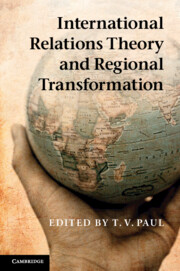Book contents
- Frontmatter
- Contents
- Figures and tables
- About the contributors
- Acknowledgments
- Part 1 Introduction
- Part 2 Realist perspectives
- Part 3 Liberal perspectives
- 5 Economic interdependence and regional peace
- 6 Regional organizations àla carte
- 7 Transforming regional security through liberal reforms
- Part 4 Constructivist perspectives
- Part 5 Eclectic perspectives
- Part 6 Conclusions
- Index
- References
7 - Transforming regional security through liberal reforms
Published online by Cambridge University Press: 05 June 2012
- Frontmatter
- Contents
- Figures and tables
- About the contributors
- Acknowledgments
- Part 1 Introduction
- Part 2 Realist perspectives
- Part 3 Liberal perspectives
- 5 Economic interdependence and regional peace
- 6 Regional organizations àla carte
- 7 Transforming regional security through liberal reforms
- Part 4 Constructivist perspectives
- Part 5 Eclectic perspectives
- Part 6 Conclusions
- Index
- References
Summary
Transforming regions into pluralistic security communities, moving from zones of war to stable zones of peace, has assumed increasing importance as the weapons of war have become more deadly. We have been fortunate thus far. Early predictions regarding the spread of nuclear weapons proved false. Far fewer states have acquired weapons of mass destruction than was feared in the 1960s when the Nuclear Non-Proliferation Treaty was being negotiated, and there were notable cancellations of the nuclear programs of Argentina, Brazil, and South Africa. It cannot be assumed, however, that this good luck will continue, as news regarding Iran and North Korea indicates; and the war centered on the Congo shows that even conventional weaponry can be terribly lethal. It is important, therefore, to identify means of preventing military conflict. The end of the Cold War provides an opportune time to address this issue.
In this chapter I use the liberal-realist model (LRM) of armed interstate conflict to identify the most promising means for transforming regions into zones of peace. The LRM is derived from social scientific research conducted over the past twenty years on the causes of militarized disputes and war. Earlier quantitative investigations proved disappointing. Studies in the 1970s of neorealist claims regarding the effect of the distribution of capabilities among the major powers were contradictory, and research on the greater peacefulness of democratic states was inconclusive. Many despaired of applying scientific methods to the study of international politics. There has been rapid progress in the last two decades, however, in statistical research on the causes of war by examining the behavior of many pairs of states through time. Stuart Bremer’s work with the LRM was path-breaking. Here, following Bremer’s lead, I analyze time series for over 12,000 pairs of states, 1885–2001, using the same techniques employed by medical epidemiologists. The results confirm that democracy and economic interdependence have important pacific benefits. Major elements of realism are also supported, but they do not provide a path to peace. Finally, I show that alternative explanations of interstate conflict – the clash of civilizations and hegemonic stability theory – are not consistent with systematic analyses of world history over the past one hundred years and more. The best hope for world peace is to continue to encourage liberal reforms: the institution of democracy and nations’ participation in the global economy. Fortunately, globalization has rapidly advanced in recent decades, and the prospects for continued expansion look good.
- Type
- Chapter
- Information
- International Relations Theory and Regional Transformation , pp. 158 - 180Publisher: Cambridge University PressPrint publication year: 2012
References
- 1
- Cited by

